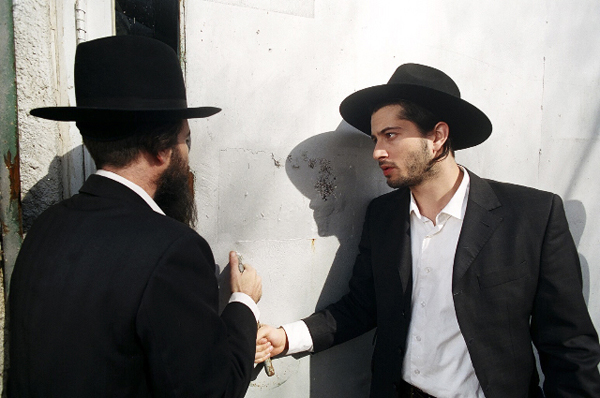|
Reviews of Recent Independent, Foreign, & Documentary Films in Theaters and DVD/Home Video

EYES WIDE OPEN
The butcher lets the younger man stay behind the store, gradually begins training him in the trade, and brings him along to Torah study. Aaron starts coming out of his shell, but it’s not just grief from his father’s recent death that he’s awakening from as he starts spending more and more time in the back of the store with the very handsome Ezri. Unlike recent feature films that portray Haredi households as extremely hypocritical, rigid, or abusive (Amos Gitai’s Kadosh, Eitan Gorlin’s The Holy Land, David Volach’s My Father My Lord), Aaron’s family is a warm haven. His wife, Rivka (an actress known as Tinkerbell), is attentive and affectionate, and when he brings Ezri to Friday night Shabbat dinner, both men delight in the glow of hearth and home, surrounded by Aaron’s four children. Neither man looks like he would be comfortable in the cosmopolitan Tel Aviv of Eytan Fox’s The Bubble. But Haim Tabakman’s debut feature also provocatively captures the homoeroticism in the sexually segregated rituals—purifying immersions in water; the binding leather straps of tefillin in devotional prayers; and the rapturous chanting in unison—that help to inflame the two men’s lust. Like the women scholars/lovers in Avi Nesher’s The Secrets, Aaron is convinced that he can bring his intellect to bear by arguing a Talmudic rationale for his liberating feelings, even while he divides his life into compartments, with Rivka at home with their children and Ezri in his back room. After the tight-knit community grows suspicious about the two men’s closeness, a rabbi tries to offer pastoral advice, but, as heard over a decade ago in Sandi Simcha DuBowski’s documentary Trembling Before G-d about Orthodox gays, there are more things in heaven and earth than are dreamt of in the religious leader’s philosophy. He cannot even fathom gay sexual relations, let alone homosexuality as an identity. The levels of disapproval escalate, from a store boycott to noisy harangues and ostracism. Both Ezri
and Aaron have to decide how to interact with this world, and Denker and
Strauss beautifully portray their characters’ emotional responses to
their complicated situation. The different risks the two characters are
willing to take and the choices they make are quite moving.
Nora Lee Mandel
|

